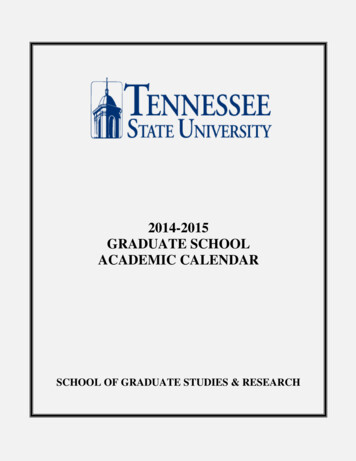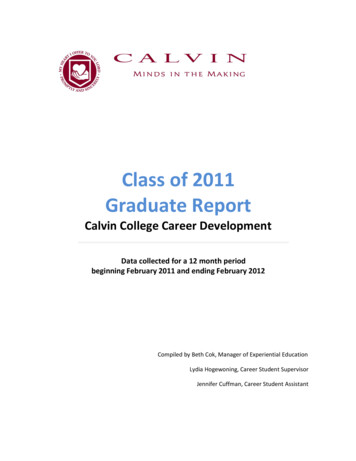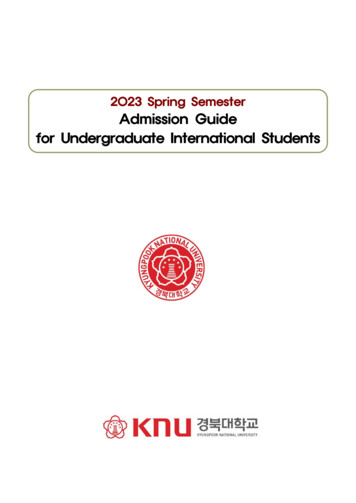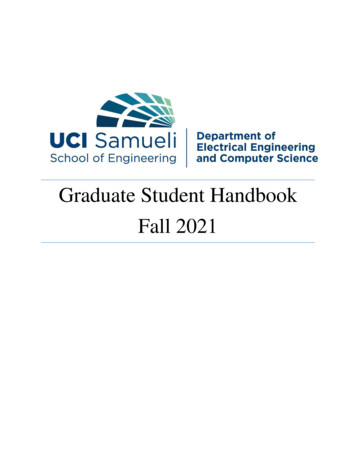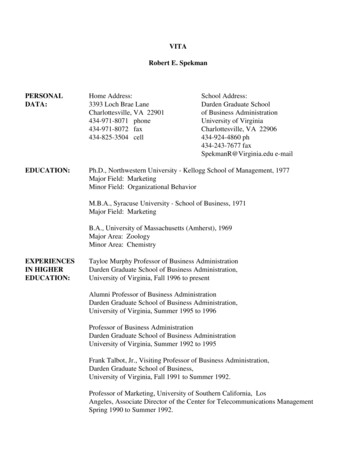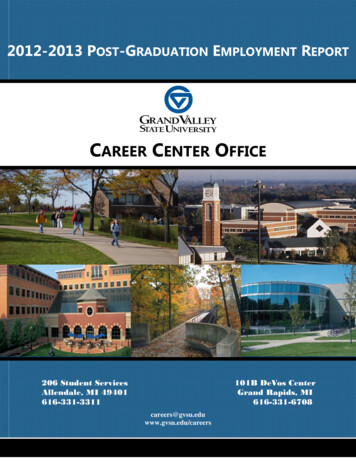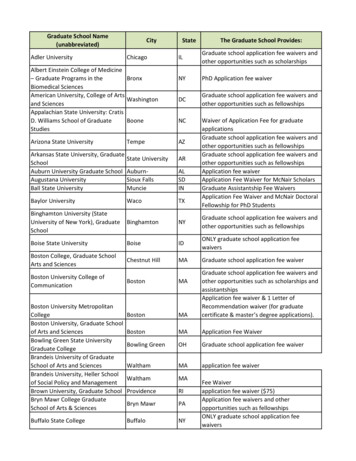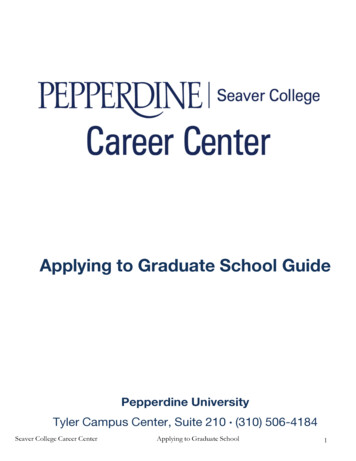
Transcription
Applying to Graduate School GuidePepperdine UniversityTyler Campus Center, Suite 210 (310) 506-4184Seaver College Career CenterApplying to Graduate School1
Table of ContentsApplying to Graduate School FAQs .3Common Misconceptions About Graduate School .4Questions for Self-Exploration .5Factors to Consider When Evaluating Graduate Schools . .6-7Ways of Evaluating Programs 8Factors Considered for Graduate School Admission .9-17Suggested Timeline for Applying to Graduate School 18-23Paying for Graduate School. 24Relevant Resources. .25-26Seaver College Career CenterApplying to Graduate School2
Applying to Graduate School FAQsWhat is graduate school?A graduate school is an advanced degree program that allows students to specialize in a particular subjectarea. At the end of the program, students graduate with a Master’s or doctoral degree, depending on theprogram selected.Why should I attend graduate school?There are a variety of reasons to attend graduate school. For example, graduate school provides students withthe opportunity to gain expertise in a particular field, make lasting friendships and connections with classmatesand professors, earn a higher salary, gain eligibility for different career opportunities and career advancement,and conduct research, to name a few.Why should I not attend graduate school?Graduate school is no small commitment, requiring many hours of classes, outside study, research, andexperiential learning requirements. It can also be expensive. For instance, graduate school tuition is often moreexpensive than undergraduate tuition, and graduate school programs typically give out less financial aid.Furthermore, it can take a lot of time. Most Masters programs are two years, Juris Doctor (or J.D., the degreeconferred to law school graduates) programs are typically three years, Ph.D. programs are five to seven years,and medical school is typically four years of study plus at least three years of residency.How many schools should I apply to?We recommend that students apply to several schools, including “reach,” “middle-of-the-pack”and “safety” schools. At the same time, students should also keep in mind the cost of applying toeach school, which includes fees upon application and for standardized tests, alongwith sending test score reports and other materials. While the ideal number of schools will varyfrom person to person, a manageable range is between five to ten schools. One exception to this ismedical school applications. For medical school applications, it is not uncommon for applicants toapply to many more schools; in some cases, applicants will apply to upwards of twenty schools.Seaver College Career CenterApplying to Graduate School3
Common Misconceptions About Graduate SchoolGraduate schools do not provide scholarships.False! While there is often not as much financial aid for graduate students, many schools still have somescholarship funds for graduate students. Students are also eligible for outside scholarships, grants, teachingassistantships, graduate assistantships, and fellowships. See page 24 for more information.Graduate school is only for [insert group here].False! Anyone with a college degree can consider graduate school. The best programs are geographically,ethnically, racially, religiously, and otherwise diverse, bringing many perspectives to the classroom andencouraging students to broaden their horizons.Graduate school rankings are the same as undergraduate school rankings.False! Many institutions have different rankings for their specific graduate programs. It is important to doyour research to learn each program’s specialties in order to identify the right fit for you.I am not prepared for graduate school.False! Pepperdine’s liberal arts education provides students with a comprehensive education that will makeyou a strong candidate for graduate study. At the same time, reference each program’s admissionrequirements to ensure that you have taken the necessary coursework and have the right amount of workexperience necessary.Graduate school is just like college all over again.False! While there are some similarities between graduate school and an undergraduate education, there aresome important differences. Generally, in graduate school, classes will be smaller, there is more of anemphasis on research, there are fewer small assignments, there is more of an academic focus, and the classesare more specialized. In addition, there tends to be less of a focus on having fun and more of an emphasison learning.I did not major in the field that I am hoping to pursue in graduate school, so I am unqualified toapply.False! Generally, graduate schools will accept students from a variety of majors, though some programs maygive preference to students with certain majors. While some programs require pre-requisite courses,applicants from a variety of academic backgrounds are typically considered.Seaver College Career CenterApplying to Graduate School4
Questions for Self-ExplorationIn deciding whether or not to apply for graduate school, consider its impact on your career, yourmotivation for applying, your financial situation, and the timing of your decision.Career Questions:1. What can I do with my undergraduate degree?2. Besides graduate school, what other ways could I continue learning?3. What career do I want to pursue?4. How do I know that this is a strong career match for me? Have I participated in job shadows,informational interviews, and/or internships in my career of choice to get a sense for the role?5. Is a graduate degree a requirement for my intended career? Will a graduate degree makeemployment easier in my career of choice? Alternatively, will a graduate degree make meoverqualified for a career, thus making my search more difficult?6. What are my short and long-term career goals? Does attending graduate school help me achievethese goals? If so, how?Motivation Questions:7. Who wants me to go to graduate school?8. How have my family members, friends, and professors influenced my decision toapply to graduate school?9. What is motivating me to apply to graduate school?Time Questions:10. Will the time and monetary investment I make for graduate school repay me in the money andexperience I earn throughout my life?11. Is now the right time for me to attend graduate school?12. Am I ready to commit to at least one more year of exams, homework, research, papers, and/orgroup projects?Financial Questions:13. Am I financially able to attend graduate school?Learning Questions:14. Are there other options available to you for continued learning in your field of choice? For instance,could you gain marketable skills through professional seminars, workshops, mass open onlinecourses (such as those offered on websites like Coursera or edX), or a training certificate?Seaver College Career CenterApplying to Graduate School5
Factors to Consider When Evaluating Graduate SchoolsNow that you have decided to apply for graduate school, how do you know what schools to apply to? Thenumber of graduate schools and programs can be overwhelming. Fortunately, there are several ways tonarrow down your list to a manageable number of schools. Consider the “GO SO FAR” method in order todetermine what programs are right for you.G: Geographic Area and surrounding communityO: Overall Cost of program and availability of financial aidS: Specific Characteristics of each programO: Overall “Fit” with your career interests and goalsF: Faculty that specialize in your area of interestA: AccreditationR: Reputation of the programGeographic Area: A school’s location is often downplayed, but it can actually have a significant impact onyour overall graduate school experience. Having been a Pepperdine student, you know that watching sunsetover the ocean can have a big boost on your mood in the midst of the stressful finals season. Outside of class,you will likely be spending your free time studying in local coffee shops and exploring the surrounding area.While you will not have quite as much free time as you did as an undergraduate student, you will still be livingin that place for a significant period of time depending on the program’s length. Ask yourself, is this a place thatyou would be happy living in for at least one year? In addition, geographic area is important when consideringwhere you want to end up after graduating. Schools tend to have their strongest connections in the surroundingcommunity. In addition, if you choose to intern or work in the area while in school, then you will beestablishing connections in that area as well. With that in mind, you may want to choose a school that is locatednear a city to have a greater number of internship and job opportunities during your program and aftergraduation.Overall Cost: What is the total cost of program? You should be able to find this figure on the school’swebsite. How available is financial aid at this institution? Applying to schools that are generous with theirfinancial aid can help you graduate debt-free. Timing also plays into this. Some schools have multiple deadlines,with early applicants receiving priority when it comes to financial aid.Specific Characteristics: Each program has specific characteristics that make it unique. This is importantbecause you can choose a school based on these characteristics. Research special opportunities thatprograms offer, such as study abroad, community service, clinics, research, and experiential learningopportunities to learn more about the specific characteristics.Overall “Fit”: Apply to schools that are a strong cultural and career fit. Ask yourself, how does thisprogram align with your career interests and goals? Do not waste your time applying to schools that youare not interested in attending. While this should go without saying, often students apply to schools basedonly on reputation without considering the fit, or just to have a safety school, not believing that they couldend up there. Instead, choose your schools based on the program’s overall fit.Seaver College Career CenterApplying to Graduate School6
Faculty: Research the faculty in your programs of interest. In your time as a student, you will developrelationships with faculty members that specialize in your area of interest, perhaps have opportunities toconduct research for those faculty members, take classes with them, and be mentored by them. Thus,researching to learn if there are faculty members who specialize in your area of interest will help youdetermine if the program is a good match for you. Also consider the student to faculty ratio, the friendlinessand approachability of faculty members, and the student research opportunities that are available.Accreditation: An accreditation is a universally recognized symbol that means that your school has met a highstandard of excellence. Choosing accredited schools dramatically enhances the value of your degree, which isespecially important as you look for employment after graduation. For more information and a complete list ofaccredited institutions, please visit this website: tion: Similarly, having a graduate degree from a highly ranked program can help you as you look forjobs in all stages of your career. Often, programs are ranked differently than the school is as a whole, so it isimportant to do your research (see page 25 for helpful resources). However, a person should be wary of pickinga school solely on reputation, as rankings typically fluctuate over time. Moreover, reputation extends beyondranking, including factors such as the faculty, style of teaching, and additional programs. If a school has a strongreputation for experiential learning or for research, knowing this in advance can help you make an informeddecision based on your interests. Likewise, consider the reputation of the students in the program, such aswhether or not they are friendly. This is important to consider because these are students that you will be takingclasses with, working in groups with, and networking with throughout graduate school and after graduation.Seaver College Career CenterApplying to Graduate School7
Ways of Evaluating ProgramsNow that you have a set of criteria to use to evaluate institutions, how can you go about gauging thesefactors? Use the following methods to learn more about programs:Research: Research programs by reading articles, reviewing school websites, talking to people andprofessors in your field, and referring to annual reports such as Peterson’s Guides and U.S. News.Attend: Attend graduate school fairs and speak with admissions representatives. Often, therepresentatives at these fairs will be the same people who review your application. Thus, be sure to beprepared, polite, and professional when interacting with them. For example, come with a few questionsin mind before attending the session. They will be able to answer specific questions regarding thecharacteristics of the program, student life, application deadlines and materials, to name a few.Interact: Talk with current or former students, alumni, and faculty. Ask them for their evaluation ofthe strengths and weaknesses of the program. In these interactions, be sure to be kind, polite, andrespectful, as they may have input as to whether or not you are admitted into the program.1Align: Determine if the academic strengths of the department fit your career goals by comparingwhat you find online and in your interactions to your own goals. A strong match in this area isimportant as you prepare for your career after graduation. For example, if there is alignment, then youradvisors can help you find career opportunities and network as you prepare for graduation. Additionally,faculty members’ specialties will influence the program’s course offerings.Visit: If possible, visit your schools of interest and take a campus tour. This will give you the bestchance to get a feel for the program, campus environment, the faculty, and students. If you cannotvisit, try to talk with current students or professors for insider 0/how-to-ace-your-grad-school-interview/Seaver College Career CenterApplying to Graduate School8
Factors Considered for Graduate School AdmissionSchools consider a variety of factors when evaluating applications. This list is by no means exhaustive, aseach school has different requirements when it comes to the application process. Nor is it listed in order ofimportance, as each school assigns a certain value to each criterion. Generally speaking, however, your testscores and undergraduate record are the most important factors of the application.GPA, Academic Major, and Quality of Undergraduate EducationYour undergraduate GPA is one of the most important factors in the admissions process. Admissions councilsalso consider factors such as the school’s ranking, reputation, and grading requirements in evaluating your GPAand overall application. They also consider applicants’ undergraduate majors. Most school’s admissions councilsare interested in admitting a diverse class, which extends to diversity in the class’s academic majors. At the sametime, some schools have requirements when it comes to undergraduate coursework, so make sure that you havetaken the necessary pre-requisites before applying.Admissions TestsAdmissions councils also use standardized admissions tests to understand their applicants’ qualifications.There are a number of different tests for graduate school, as described below:Graduate Record Exam (GRE):General GRE Exam: The GRE is a “general” graduate admissions test and is required for most Masters and PhDprograms. The General Test will examine your verbal, quantitative, and analytical abilities in anattempt to measure your potential success in graduate school. The GRE Revised General Test is a computerized exam that is section-level adaptive.Essentially, this means that the difficulty level for the second section of each measure isbased on your performance in the first section. Test-takers are allowed to skip and returnto questions within a section. The GRE is offered at many testing facilities. Unlike the other exams, is offered most daysthroughout the year. Scores on the GRE General Test are valid for up to five years. Many business schools (MBA programs) now accept the GRE in lieu of the GMAT. However, some stillprefer the GMAT. Kaplan offers a free practice test on their website:http://www.kaptest.com/pages/practice?utm source field&utm medium offline&utm term &utm content evergreen&utm campaign grad-pangrad-fpt-2015 For more information and to register go to: www.gre.org.Subject GRE Exam: The GRE Subject Test will examine your knowledge of a particular academic subject including:Biochemistry, Biology, Chemistry, Literature in English, Mathematics, Physics, and Psychology. These tests are administered on paper three times per year: April, September, and October. For more information and to register go to: www.gre.org.Seaver College Career CenterApplying to Graduate School9
Graduate Management Admission Test (GMAT): The GMAT is a standardized test used by most business schools to assess the qualificationsof applicants. Scores are used to predict your academic performance during the first year. The four sections of the GMAT contain an analytical writing assessment and questionson integrated reasoning, quantitative, and verbal skills.o For detailed information on the Analytical Writing Assessment, please format-timing/analyticalwriting-assessment.aspxo For detailed information on the Integrated Reasoning Assessment, please format-timing/integratedreasoning.aspxo For detailed information on the Quantitative Assessment, please formattiming/quantitative.aspxo For detailed information on the Verbal Assessment, please format-timing/verbal.aspx The test is offered most weekdays and some Saturdays, but cannot be taken more than oncea month. For tips on how to prepare for the GMAT, please see: -gmat-exam.aspx?WT.svl HPCallison Kaplan also offers a free practice test for the GMAT:http://www.kaptest.com/pages/practice?utm source field&utm medium offline&utm term &utm content evergreen&utm campaign grad-pangrad-fpt-2015 For more information and to register go to: www.mba.com.Law School Admission Test (LSAT): All U.S. law schools registered with the Law School Admission Council (LSAC)require applicants to take the LSAT examination prior to applying. Some other nonJD graduate programs will accept the LSAT instead of the GRE. The test is a multiple-choice format that contains reading comprehension, analyticalreasoning, and logical reasoning questions. There is also a writing sample at the end of theexam, which is meant to demonstrate your writing ability. The LSAC does not score thewriting sample. Instead, the LSAC includes the writing sample in the score report it sends tothe graduate schools you are applying to.i. For detailed information on the Reading Comprehension questions, please ehensionii. For detailed information on the Analytical Reasoning questions, please asoningiii. For detailed information on the Logical Reasoning questions, please ning The LSAT is offered four times each year, in February, June, October, and December. Usually, thedeadline to register is over one month before the test, so be sure to plan accordingly. Kaplan also offers a free practice test:Seaver College Career CenterApplying to Graduate School10
http://www.kaptest.com/pages/practice?utm source field&utm medium offline&utm term &utm content evergreen&utm campaign grad-pangrad-fpt-2015For a good timeline for the law school application process, see: iew/infographic-application-processFor additional information on the law school admissions process specifically, please see the followingresource guide: ent/students/gradprep/law-schoolpacket.pdfFor more information and to register go to: http://www.lsac.org/jd/lsat/about-the-lsatMedical College Admission Test (MCAT): Almost all medical colleges require the MCAT examination as a way to compareapplicants and to predict first year success in medical school. The MCAT is a standardized, multiple-choice test designed to assess problem solving,critical thinking, and writing skills in addition to the applicant’s knowledge of scienceconcepts and principles prerequisite to the study of medicine. Scores are given in verbal reasoning, physical sciences, writing, and biological sciences. MCAT scores are valid for approximately three years. Kaplan also offers a free practice test:http://www.kaptest.com/pages/practice?utm source field&utm medium offline&utm term &utm content evergreen&utm campaign grad-pangrad-fpt-2015 For more information and to register go to: www.aamc.org.Seaver College Career CenterApplying to Graduate School11
Test FAQsWhich test should I take?Generally speaking, Masters of Arts and Ph.D. programs require the GRE, MBA programsrequire the GMAT, J.D. programs require the LSAT, and Medical schools require the MCAT.Recently, some business schools have started accepting the GRE as an alternative to the GMAT.However, each program varies, so be sure to reference your program’s specific requirements inorder to determine what tests are required. Having a clear sense of the types of programs you areinterested in will help you decide which test you should take.I loathe standardized tests because they make me so nervous! How can I overcome testtaking anxiety?Remember that the exam is only one component of the application. Students who are relaxedduring the exam are able to perform to the best of their abilities. The Counseling Center atPepperdine is free for all students and can walk you through some strategies to help you relaxduring the stressful exam environment.Should I take a test preparation course?Many of these courses are focused on preparing students to think and approach problemsstrategically. While sometimes expensive, these courses have high success rates and can educateapplicants on best test-taking strategies. Often, these courses offer discounts to Pepperdinestudents if you attend one of their information sessions on campus. One of the biggest benefitsof these courses is that they force you to take the time to review the material covered on theexam. Since you are paying for the course, you have increased motivation to study the material asassigned.Alternatively, students successfully gain admission to top graduate programs without taking a testpreparation course. If you are not interested in a prep course, start studying on your own with astudy guide, such as ETS’s “The Office Guide to the GRE Revised General Test” orPrinceton Review’s “Cracking the GRE.”My brother’s best friend’s sister [or insert other relationship here] got a perfect score onthe [insert name of exam here] without studying at all. Should I wing the test?While a small portion of the population may be able to successfully wing it, the vast majority ofpeople are not able to reach their highest potential score without studying ahead of time. Just asyou wouldn’t wing the final exam of a class, it’s certainly your safest bet to review the materialwell in advance in order to attain a competitive score. Even the sheer fact of being familiar withthe amount of time allowed in each section, the number of sections on the exam, and the materialcovered will help minimize test-taking anxiety and maximize performance. Additionally, manyschools keep track of how you did on your all of your exam scores for the same test, looking atyour application holistically. This can be problematic for students who wing their first test and dopoorly and then end up taking it again, ending up with a much higher score. Furthermore, giventhe expense of simply taking the exam, going into the test unprepared may not be cost-effective.I do not think I did well on the test. What should I do?Some tests give you the option of canceling your scores at the testing center right after you finishthe exam. For example, on the GRE, you can cancel your score immediately after taking the test.However, if you cancel your score, you are not refunded for the test. Keep in mind that the GRESeaver College Career CenterApplying to Graduate School12
offers a score select option that lets you choose your best scores, so if you are concerned aboutone section in particular, score select might be your best option. For more information about theGRE’s policies specifically, please visit their website at:https://www.ets.org/gre/revised general/test day/policies/.I did not do as well as I hoped to do on the test. What should I do?First, take a deep breath and do not be too hard on yourself. If you are following the CareerCenter’s suggested timeline listed on pages 18-23, we have allotted enough time for students toretake the test as needed and still attend graduate school immediately after finishing college.Remember that while test scores are an important part of the graduate school application, theyare not the only factor considered. Schools look at candidates holistically, considering their gradesand personal statements, among other criteria, in making their admissions decisions. If you trulydo not want to take the exam again, you can move forward with your current application andwork hard to make sure you are stellar in all other areas. Alternatively, you can decide not toapply to graduate school anymore. However, do not base this decision solely on your scores;instead, consider if graduate school still aligns with your goals.Can I get a test waived?Some institutions do not require a standardized test. For example, Pepperdine University’sSchool of Public Policy does not require Seaver students to take the GRE. Some schools allowyou to replace one test for another, such as replacing the GRE with the LSAT, as is the case withPepperdine University’s Master’s in Dispute Resolution program. Do your research on eachschool to learn about your options so that you can make an informed decision.Can I get a fee waiver for the exam?The GRE allows eligible students to receive a 50% discount on the exam. Apply as soon as possiblefor these fee reductions, as they are distributed on “a first-come first-serve basis.” ee reduction/ for details on the GRE’s financialassistance program. Likewise, if you meet the criteria set out by the LSAC, you are eligible for aLSAT fee waiver. See http://www.lsac.org/jd/lsat/fee-waivers for more information. Studentsinterested in medical school can also receive a fee waiver for the exam. For information on eligibilityand how to apply, please see alschool/article/eligibility/. Unlike the others, the GMAC does not give fee waivers to studentsthemselves for the GMAT. However, it does give schools the opportunity to apply for grants, whichthey can use to assist students who want to take the GMAT. Thus, sometimes your undergraduateinstitution can help you with a fee waiver. For additional information, please fee-waivers.aspx aver College Career CenterApplying to Graduate School13
Personal Statement2Another factor considered by admissions councils is the Personal Statement. This is an idealopportunity for students to “speak” to the admissions committee. Applicants can use this part ofthe application to give a picture into their personality and research and professional interests. Manypeople recommend writing this as if you were writing directly to the professor of interest. Be sureto follow page restrictions and answer the questions requested, if applicable. In your statement,discuss the program you are applying to, personal and academic background, research andprofessional interests, research and teaching experience, ways in which this program will fit thoseneeds, which professor you hope to work with, and how this person’s research matches w i t hyour interests. Be sure to have your advisor, a professor, a Writing Center tutor, and/or a CareerCenter Industry Specialist or Career Ambassador read over your statement. The more eyes thebetter. For more information on writing a personal statement, please see the Career ments.htmand nts/gradschool/Letters of RecommendationLetters of Recommendation are an important part of the graduate school admissions process. Inchoosing your recommenders, please consider the following information: Read the Directions: While most schools ask for 2-3 letters of recommendation, eachschool has their own requirements when it comes to letters of recommendation. Some willask for academic recommendations, others for supervisor recommendations, and others forrecommendations from both. Choose your references carefully: Your letters serve as a strong support of who youare as a student and what you can potentially offer to a graduate program or dep
Graduate school is no small commitment, requiring many hours of classes, outside study, research, and experiential learning requirements. It can also be expensive. For instance, graduate school tuition is often more expensive than undergraduate tuition, and graduate school programs typically give out less financial aid.
